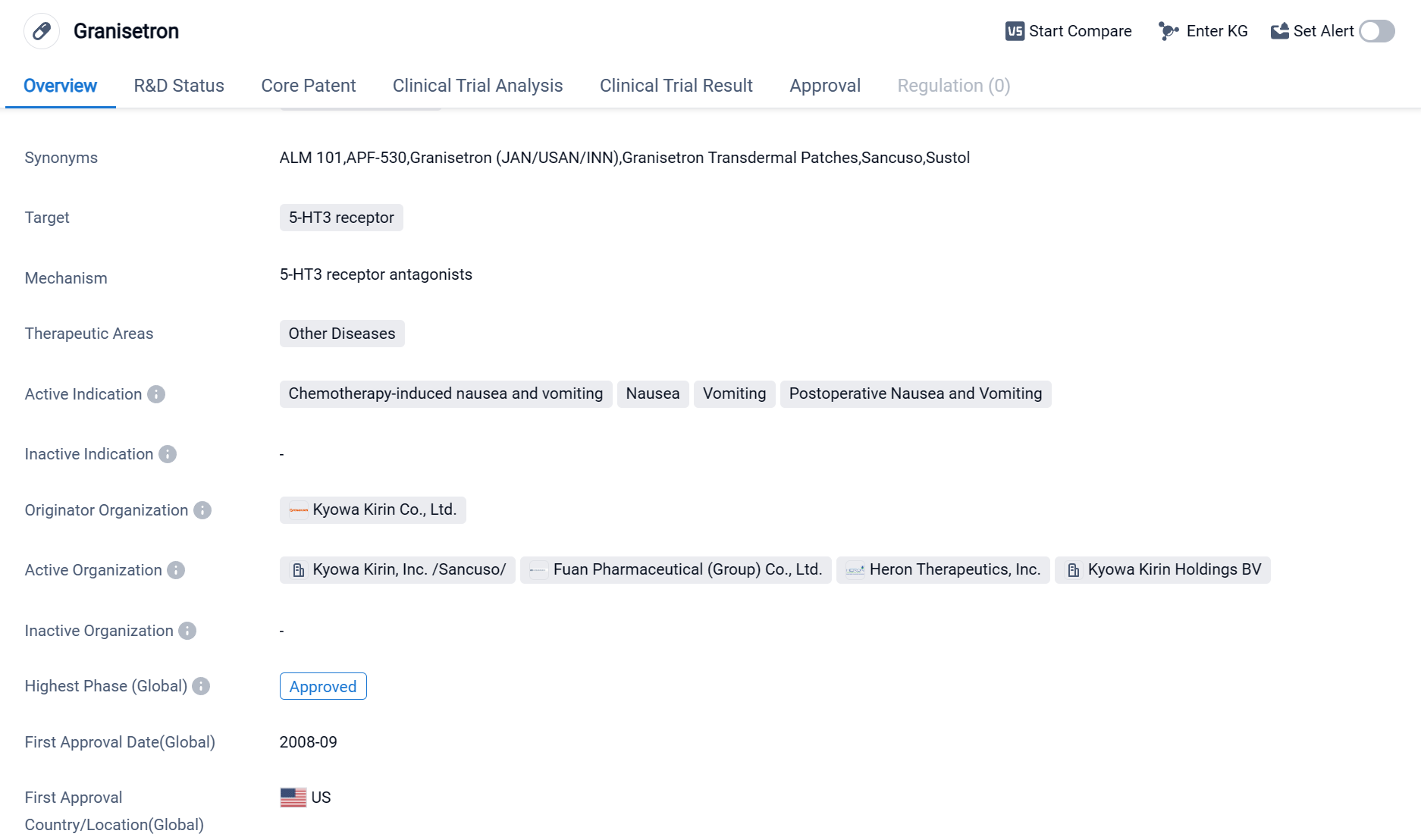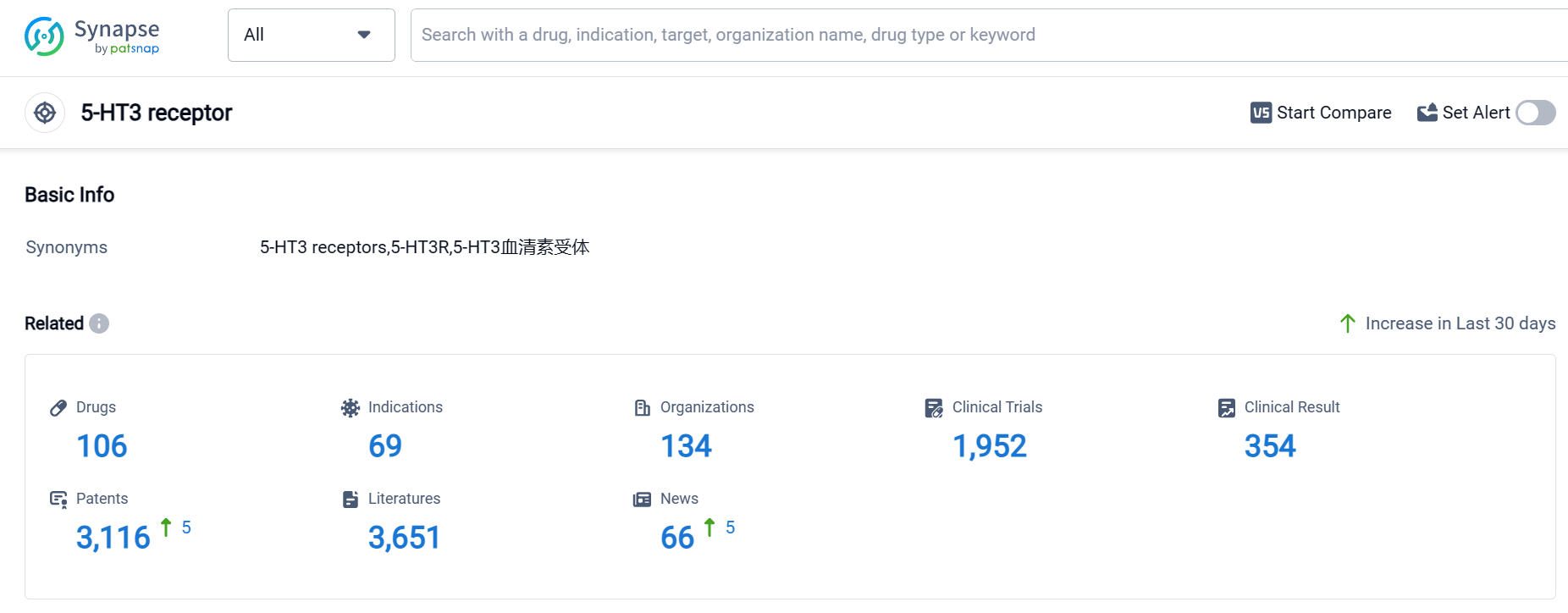Pharmaceutical Insights: Granisetron's R&D Progress and its Mechanism of Action on Drug Target
Granisetron's R&D Progress
Granisetron is a small molecule drug that targets the 5-HT3 receptor. It is primarily used in the treatment of chemotherapy-induced nausea and vomiting, as well as other forms of nausea and vomiting, including postoperative nausea and vomiting. The drug was first approved for use in the United States in September 2008.
Granisetron is developed by Kyowa Kirin Co., Ltd., a pharmaceutical company that specializes in the research and development of innovative drugs. The drug has reached the highest phase of development, with approvals in the global market.
Chemotherapy-induced nausea and vomiting is a common side effect of cancer treatment, and it can significantly impact the quality of life for patients. Granisetron works by blocking the action of serotonin, a neurotransmitter that is involved in the regulation of nausea and vomiting. By targeting the 5-HT3 receptor, the drug helps to alleviate these symptoms and improve patient comfort during chemotherapy.
In addition to its use in chemotherapy-induced nausea and vomiting, Granisetron is also indicated for other forms of nausea and vomiting. This includes postoperative nausea and vomiting, which can occur after surgical procedures. By effectively managing these symptoms, Granisetron can contribute to better patient outcomes and satisfaction.
Its approval in the United States in 2008 marked an important milestone in the treatment of chemotherapy-induced nausea and vomiting.
👇Please click on the image below to directly access the latest data (R&D Status | Core Patent | Clinical Trial | Approval status in Global countries) of this drug.
Mechanism of Action for Granisetron: 5-HT3 receptor antagonists
5-HT3 receptor antagonists are a class of drugs that act on the serotonin 5-HT3 receptors in the body. These receptors are found in the central nervous system and the gastrointestinal tract. By blocking the action of serotonin on these receptors, 5-HT3 receptor antagonists can help alleviate symptoms such as nausea and vomiting.
From a biomedical perspective, 5-HT3 receptor antagonists are commonly used in the treatment of chemotherapy-induced nausea and vomiting, as well as post-operative nausea and vomiting. They work by inhibiting the binding of serotonin to the 5-HT3 receptors in the brain and gut, thereby reducing the signals that trigger nausea and vomiting.
Some examples of 5-HT3 receptor antagonists include ondansetron, granisetron, and palonosetron. These drugs are typically administered orally or intravenously, and their use is well-established in clinical practice. They are considered safe and effective in managing nausea and vomiting associated with various medical conditions and procedures.
Overall, 5-HT3 receptor antagonists play a crucial role in controlling nausea and vomiting, providing relief to patients undergoing chemotherapy, surgery, or experiencing other conditions that cause these symptoms.
Drug Target R&D Trends for Granisetron
According to Patsnap Synapse, as of 17 Sep 2023, there are a total of 106 5-HT3 receptor drugs worldwide, from 134 organizations, covering 69 indications, and conducting 1952 clinical trials.
The analysis of the target 5-HT3 receptor reveals a competitive landscape with multiple companies involved in the development of drugs. The companies with the highest number of approved drugs are Fuan Pharmaceutical (Group) Co., Ltd., Takeda Pharmaceutical Co., Ltd., and Helsinn Holding SA. The R&D progress varies among these companies, with some having drugs in multiple phases.
The approved drugs under the target 5-HT3 receptor cover a wide range of indications, including nausea, vomiting, chemotherapy-induced nausea and vomiting, and irritable bowel syndrome. Small molecule drugs dominate the development, but there is also one herbal medicine in Phase 3 development.
China, the United States, and Japan are the leading countries in terms of approved drugs. However, other countries/locations also show progress in the development of target 5-HT3 receptor drugs.
Overall, the current competitive landscape of the target 5-HT3 receptor is dynamic, with multiple companies, drug types, and countries/locations involved. The future development of this target will likely continue to see advancements in R&D and the approval of drugs for various indications.
👇Please click on the picture link below for free registration or log in directly if you have a freemium account, you can browse the latest research progress on drugs, indications, organizations, clinical trials, clinical results, and drug patents related to this target
Conclusion
Overall, Granisetron is a small molecule drug that targets the 5-HT3 receptor and is used in the treatment of chemotherapy-induced nausea and vomiting, as well as other forms of nausea and vomiting. Developed by Kyowa Kirin Co., Ltd., the drug has received approvals in the global market. Its effectiveness in managing these symptoms makes it a valuable option for patients undergoing cancer treatment or surgical procedures.






